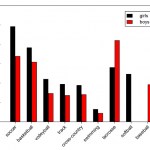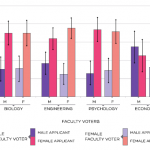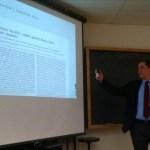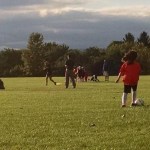Social-Science
The topic of sports injuries is unavoidable these days-- the sports radio shows I listen to in the car probably spend an hour a week bemoaning the toll playing football takes on kids. Never a publication to shy away from topics that bring easy clicks, Vox weighs in with The Most Dangerous High School Sports in One Chart. You can go over there to look at their specific chart, which is drawn from a medical study of cheerleading; I don't find the general ordering of things all that surprising.
There was, however, one aspect of this that I found sort of surprising, namely the difference between…
A few things about the academic job market have caught my eye recently, but don't really add up to a big coherent argument. I'll note them here, though, to marginally increase the chance that I'll be able to find them later.
-- First, this piece at the Guardian got a lot of play, thanks in part to the dramatic headline Science careers: doomed at the outset but even more thanks to the subhead "Has it become harder for graduate students to thrive, and are our best potential scientists giving up on academia?" Most of the people I saw re-sharing it used basically just that last clause, often…
I continue to struggle to avoid saying anything more about the Hugo mess, so let's turn instead to something totally non-controversial: gender bias in academic hiring. Specifically, this new study in the Proceedings of the National Academy of Science titled "National hiring experiments reveal 2:1 faculty preference for women on STEM tenure track" with this calm, measured abstract that won't raise any hackles at all:
National randomized experiments and validation studies were conducted on 873 tenure-track faculty (439 male, 434 female) from biology, engineering, economics, and psychology at…
Everybody and their extended families has been sharing around the Fareed Zakaria piece on liberal education. This, as you might imagine, is relevant to my interests. So I wrote up a response over at Forbes.
The basic argument of the response is the same thing I've been relentlessly flogging around here for a few years: that while I'm all for a broad education, the notion that studying a STEM subject and studying "the human condition" are in opposition or even cleanly separable is just foolish. But it's a great excuse to start that argument at Forbes, so...
It's always a pleasure to see former students doing well, and to that end, we invited one of my former thesis students, Mike Mastroianni, class of 2007, to give a colloquium talk last week in the department. Mike went to physics grad school for a couple of years after graduation, but decided he was more interested in education issues, and is now in the process of writing his dissertation (to be defended in a few weeks) in a Curriculum and Instruction program at the University at Albany.
He gave a really interesting talk on his thesis work, looking at the evolution of gender ratios in STEM…
There was some Twitter chatter the other night about a new arxiv paper called The Gender Breakdown of the Applicant Pool for Tenure-Track Faculty Positions at a Sample of North American Research Astronomy Programs:
The demographics of the field of Astronomy, and the gender balance in particular, is an important active area of investigation. A piece of information missing from the discussion is the gender breakdown of the applicant pool for faculty positions. For a sample of 35 tenure-track faculty positions at 25 research universities advertised over the last few years in astronomy and…
A sort of follow-up to last week's post about the STEM "pipeline". In discussions on Twitter sparked by the study I talked about last week, I've seen a bunch of re-shares of different versions of this graph of the percentage of women earning undergrad degrees in physics:
Fraction of BA/BS degrees in physics awarded to women over time. From AIP Statistical Research.
You can clearly see that after a fairly steady rise through the 80's and 90's, this trend has flattened out over the last decade. If you crop the horizontal axis to start in the early 2000's, you can actually see a decline from…
Via Curt Rice (or, more precisely, somebody on Twitter who posted a link to that, but I didn't note who) there's a new study in Frontiers in Psychology of the STEM "pipeline", looking at the history of gender disparities in STEM degrees. You can spin this one of two ways, the optimistic one being "Women now continue on from bachelors degrees to Ph.D.'s at the same rate as men!" and the pessimistic one being, well, Rice's post.
The accurate description, as is often the case in social science, "This stuff is really messy and confusing." Rather than being a set of nice straight pipes going from…
I've seen a lot of reshares of this report about the long-term effect of gender bias in elementary math, which comes from an NBER working paper about a study of Israeli schools. The usual presentation highlights one specific result, namely that on a math test graded by teachers who knew the names of the students, boys outscored girls, but a blinded test saw girls outscore boys.
This sounds pretty damning, but also kind of puzzling-- is there really that much room for partial credit in elementary school math? Looking at the actual paper (which you can get emailed to you if you have a .edu…
Probably the dumbest person I've ever met in my life was a housemate in grad school. I didn't do my lab work on campus, so I wasn't living in a neighborhood where cheap housing was rented to students, but in a place where folks were either genuinely poor, or in the market for very temporary lodgings while they looked for something better. There were low-income housing units across the street, and also an apartment building full of families who didn't quite qualify for welfare.
This particular guy rented one of the other rooms in the house, and worked a series of unskilled jobs-- assistant on…
Yesterday's Open Letter to Neil deGrasse Tyson struck a chord with a lot of people, and has spread a good distance on social media, which is gratifying. Given the delocalized nature of modern social media, though, it means I'm having essentially the same argument in five different places via different platforms. In the interest of consolidating this a tiny bit, then, let me post some follow-up stuff here.
-- The most charitable interpretation of the tweet I objected to is that it's meant as praise for good students. The idea being that good students will learn in the absence of good teaching…
Blogging will continue to be light to nonexistent, as it's crunch time in a lot of ways at the moment, including our double tenure-track search. Which it would be inappropriate to talk about in any more detail than "Wow, this is a lot of work."
There are, however, two academic-job-related things that I probably ought to mention briefly. One is this Inside Higher Ed Essay about metaphors for the academic hiring process, which rightly points out a lot of the problems with the "lottery" analogy that lots of people like to use. In fact, Gerry Canavan argues, it's best understood as a game:
But…
Two language-related items crossed in the Information Supercollider today: the first was Tom's commentary on an opinion piece by Robert Crease and Alfred Goldhaber, the second Steven Pinker on the badness of academic writing.
All of them are worth reading, and I only have small dissents to offer here. One is that, unlike Tom and Crease and Goldhaber, I'm actually just fine with the popular usage of "quantum leap" for a particularly dramatic change. Yes, I realize that the canonical "quantum jump" is the smallest possible change, but I think that's putting too much emphasis on only one aspect…
The London School of Economics has a report on a study of academic refereeing (PDF) that looked at the effect of incentives on referee behavior. They found that both a "social incentive" (posting the time a given referee took to turn around the papers they reviewed on a web site) and a cash incentive ($100 Amazon gift card for meeting a 4-week deadline) worked to increase the chance of a referee accepting a review request, and improved the chances that they would meet the deadline. The effect of cash was a little smaller for tenured faculty, but they were slightly more susceptible to the…
Steven Pinker has a piece at the New Republic arguing that Ivy League schools ought to weight standardized test scores more heavily in admissions. this has prompted a bunch of tongue-clucking about the failures of the Ivy League from the usual suspects, and a rather heated concurrence from Scott Aaronson. That last finally got me to read the piece, because I had figured I would be happier not reading it, but I wanted to see what got Scott so worked up.
Sadly, my first instinct was correct. It starts off well enough, taking down an earlier anti-Ivy League piece by William Deresiewicz for being…
Via a whole bunch of people on social media, there's a new study of gender roles in academia, which the Washington Post headlines "Study: Male scientists want to be involved dads, but few are". This is not inaccurate. Some quotes that jumped out at me:
“Academic science doesn’t just have a gender problem, but a family problem,” said Sarah Damaske, a sociology professor at Penn State and one of the report’s authors. “We came to see that men or women, if they want to have families, are likely to face significant challenges.”
The study, Damaske said, showed there was potential for change, in…
Over at FiveThirtyEight, they have a number-crunching analysis of the number of papers (co)authored by women in the arxiv preprint server, including a breakdown of first-author and last-author papers by women, which are perhaps better indicators of prestige. The key time series graph is here:
Fraction of women authors on the arxiv preprint server over time, from FivethirtyEight.
This shows a steady increase (save for a brief drop in the first couple of years, which probably ought to be discounted as the arxiv was just getting started) from a bit over 5% women in the early 90's to a bit…
The latest in a long series of articles making me glad I don't work in psychology was this piece about replication in the Guardian. This spins off some harsh criticism of replication studies and a call for an official policy requiring consultation with the original authors of a study that you're attempting to replicate. The reason given is that psychology is so complicated that there's no way to capture all the relevant details in a published methods section, so failed replications are likely to happen because some crucial detail was omitted in the follow-up study.
Predictably enough, this…
A bunch of people were talking about this Nature Jobs article on the GRE this morning while I was proctoring the final for my intro E&M class, which provided a nice distraction. I posted a bunch of comments about it to Twitter, but as that's awfully ephemeral, I figured I might as well collect them here. Which, purely coincidentally, also provides a nice way to put off grading this big stack of exam papers...
Anyway, the thrust of the article is that the GRE is a bad thing to be using as an admissions criterion for graduate school in science and engineering, because it has large…
That recent study on active learning continues to generate some press, including a new interview with Carl Wieman about why traditional lectures are problematic. Wieman is pretty blunt about his opinions on the subject, which will come as no surprise to people in the AMO physics community...
Anyway, while most of the rest of the academic nation is into final exams and even graduation parties, we still have two more weeks of class after this one, and we're giving an exam tonight in my intro E&M class. Which means I'm still spending a lot of time thinking about this stuff. Some related…







